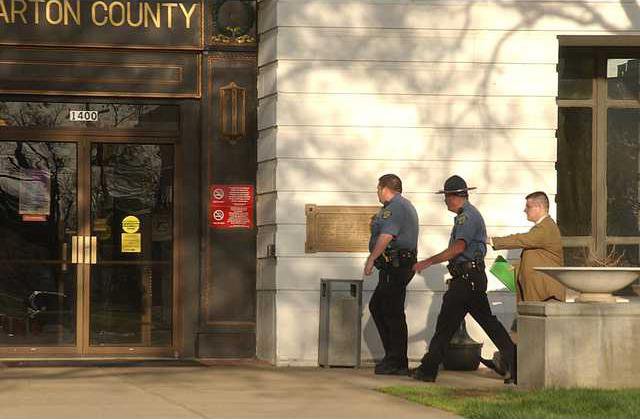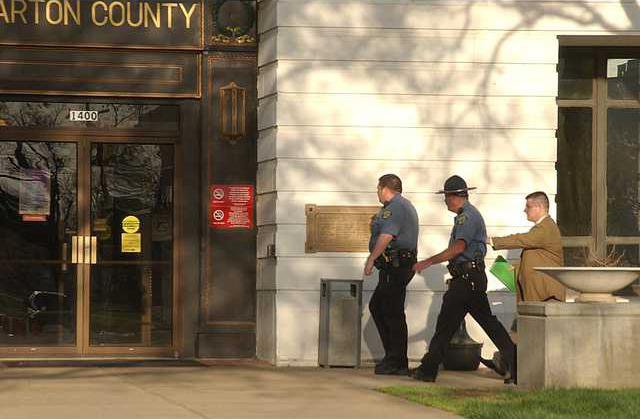Jury selection in the trial for Adam Longoria entered its first day Monday as attorneys for both the accused murderer and the State of Kansas started whittling the 400-juror pool down to 12 plus two alternates.
As of the end of proceedings late Monday afternoon in the Barton County Courthouse, 19 had been “passed for cause.” The goal is to reach 42, and it is from that batch lawyers would being striking those with whom they take issue.
The trial for Longoria, the man suspected of killing 14-year-old Alicia DeBolt after attempting to sexually assault her the night of Aug. 21, 2010, is expected to last up to two weeks. Opening statements are scheduled for as soon as the jury is selected, a process that may take four days.
DeBolt’s charred remains were found on Aug. 24, 2010, one day after she was to have started her freshman year at Great Bend High School.
Prospective jurors are selected after a competency evaluation known as voir dire, where questions are asked to determine if they will be unbiased. Barton County District Judge Hannelore Kitts has asked reporters who attend voir dire not identify prospective jurors, for security and fair trial purposes, said Ron Keefover, Judicial Administration’s education-information officer.
For this reason, comments made by the prospective jurors will only be generalized in this story.
The first group, consisting of two panels with 18 prospects each, sat through the tedious interview process Monday. Each panel took its turn in the jury box as prosecutor Kevin O’Connor with the Office of Kansas Attorney General, and defense attorney Jeff Wicks with the Kansas Death Penalty Defense Unit, took turns meticulously probing the candidates.
All of the called for jury duty had already filled out a questionnaire covering their backgrounds. Topics included familiarity with the case and attitudes towards it, if they’d ever been a victim of a crime, if they knew the defendant or the victim, and if they new any of the potential witnesses. There were also health questions.
“Whose happy to be here?” O’Connor joked in his opening question. He told those in the first panel he understood what a hardship and inconvenience it was to take part.
But, “our goal is to get the best jury we can for this case,” he said. Although he mixed humor with his questions to put the panel members at ease, he said this is a very serious case.
“It is our responsibility to prove the defendant guilty, not the defense’s responsibility to prove the defendant innocent,” O’Connor said. “You have to decide this case based on what you hear in court” and not from the news media, social media or talk on the street.
“We realize this is a burden on you,” he said. “But, this is a privilege. This is a responsibility.”
O’Connor told the prospective jury members the defendant is entitled to certain rights. Among them are the right to be presumed innocent and to have the case decided based on evidence presented in the courtroom only.
“These rights are important,” he said. “They are rights you would want if you were in (the defendant’s) chair.”
Nonetheless, “we realize some of you come to the courtroom with prejudices,” O’Connor said. “We understand you don’t live in a vacuum. This case has generated a lot of attention.”
People also bring their own experiences to the case. “It takes self discipline” to be objective. “These are tough questions.”
He said the state has to prove its case “beyond a reasonable doubt.” The state also has to prove there was, indeed, a crime, it was done intentionally and with pre-meditation, and took place where it says it took place.
This is a capital murder case, but he said there is no death penalty on the table. The jury won’t have to decide punishment, if there is a conviction.
Both sides, he said, deserve a fair trial.
“This is reality, not TV,” O’Connor said. It doesn’t work like it does on “Law and Order” or “CSI.” “These are real people. There was a real person killed and these are real police officers.
“We recognize how serious this is,” he said. “You can be sympathetic; you just can’t let that guide your decision.”
The defense, he said, has to right to remain silent and not present a case at all. And, if the jury had to make a decision at the end of the day Monday, they would have to find the defendant innocent since the prosecution hadn’t presented any evidence.
“This is an emotional case,” Wicks said. But, this has to be set aside.
He asked about a telephone survey conducted on behalf of the defence of Barton County residents who were prospective jurors. Only two of the panel members’ wives had been called to participate.
He also asked who had attended a candlelight vigil in honor of DeBolt after her body was found. Only a few had been there.
In addition, Wicks inquired who had been following earlier proceedings and if coverage of those would taint their opinions.
“This is a case where you really have to look deep,” Wicks said. There will be gruesome crime scene and autopsy photos shown.
But, “you might get sick, but you can’t get angry” and allow the images to impact the verdict, O’Connor said.
As the day wore on, the first panel dwindled from 18 to 10 and the second from 18 to nine, as members were excused for their lack of objectivity or for medical reasons. The two panels of group two will be in court Tuesday, starting at 9 a.m.
Kitts admonished those who passed to not discuss the case or read about it in the newspapers, watch coverage on television or surf the Internet.
AND SO IT BEGINS
Jury selection in Longoria case underway





